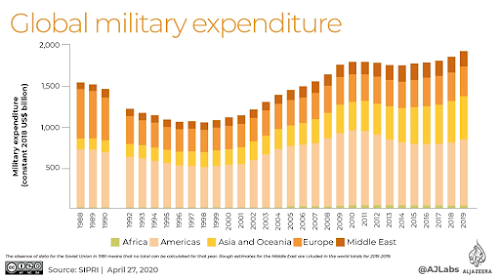The Economics of Militarisation
Kashvi Singh
All throughout history, military power has remained at the
core of world politics, but are we to see this change in the 21st
century? As we begin to focus our attention on global trade and cooperation,
would the incentive to build mighty armies shrink? Or will military power still
dictate a nation’s level of influence in the global political sphere? There is
good reason to believe in both.
With the resurgence of the nuclear arms race, the unending conflict in the Middle East, Russia’s ambitious military policy, and an overall increase in global military spending, the path that world leaders have chosen for the future of militarism becomes evident to the extent, that whether or not economic interdependence can prevent future military action becomes uncertain. Advocates for militarisation would defend this on the grounds of financial gains that are extracted from the military, which can undoubtedly, be an asset to a nation’s economy. The main contribution of the military sector to the economy is the provision of jobs. As of 2019 for example, roughly 0.2% of the UK’s population was directly employed by the defence industry. Furthermore, some argue that even though military expenditure might not improve GDP levels directly, it helps the economy by reducing risk and by providing political stability.
However, one must
understand the enormous opportunity cost involved with spending large
proportions of a nation’s GDP on the defence sector. The first and the most
obvious being the misuse of financial resources available, as many nations
prioritise spending for military over other necessary sectors that contribute
directly to the quality of life. An extreme but nonetheless relevant example of
this is North Korea. Last year, North Korea ranked No.1 in military spending as
percentage of GDP. “According to the State Department's World Military
Expenditures and Arms Transfers 2019 report, the North's military expenditure
averaged about US$3.6 billion a year. That accounts for 13.4 to 23.3 percent of
the country's average GDP of $17 billion during the period 2007-2017.” At the
same time, reports of North Korea’s crumbling health care sector [1] show how prioritising military spending over other essential services can
damage the standard of living in the long run. To put things in perspective,
money that is used for the production or purchase of armaments is money that is
not available to vaccinate children against disease, to provide people with
clean drinking water, to assist local industries or to supply credit to local
farmers. So, while nations sign arms deals worth billions of dollars, the World
Health Organisation remains underfunded to carry out crucial programmes in
EDC’s and LIDC’s.
Another problem with
prioritising military over other sectors is that of Research & Development.
A study by ‘Project Ploughshares’ finds, that more money is spent on military
R&D than research into energy, pollution control, health and agriculture
combined. In a world that is often urged to cooperate and work together to
tackle global issues such as environmental degradation or world hunger,
militarisation which is often also the root of these problems, comes in the way
of solving them too.
Moreover, military finances also aggravate the problem of
debt in developing nations. 25% of the debt that is owed by the developing
world to the developed world, accounts for arms imports. This debt not only
burdens these nations economically, it also directly affects the already
crippling health and education systems, leaving governments with hardly any
revenue left for welfare spending to support sustainable development, while
also preventing inward investment into businesses that might help support the
economy.
While it is obvious that nations are not willing to give up
the concept of militarism any time soon, we must realise that the consequences
brought about by militarisation far outweigh its so-called benefits. Excessive
funding to military not only disrupts peace, but also prevents sustainable
development by depriving other essential sectors their due share of investment.
References:




Comments
Post a Comment